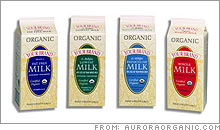An organic milk ripoffThe government says one of the nation's largest producers of organic milk has been breaking the rules, says Fortune's Marc Gunther.NEW YORK (Fortune) -- Some consumers pay $5 or $6 a gallon for organic milk, up to twice as much as the conventional kind. They're not always getting their money's worth. A company that supplies milk to Wal-Mart, Costco, Target and Safeway was charged last week with selling milk labeled organic that failed to meet the national organic standards.
In order to be classified as organic, foods need to follow the guidelines outlined in the Organic Foods Production Act. Among other things, foods labeled organic should be produced using no fertilizers or pesticides and come from animals free of antibiotics or growth hormones. Aurora Organic Daily, a private company based in Boulder, Colorado, says it never broke any rules. But Aurora, which operates large-scale organic farms in Colorado and Texas, signed a consent decree with the U.S. Department of Agriculture, promising to clean up its act. "We're doing a transformation - cows reduced, pasture increased, all animals organic from birth and a significantly increased commitment to research," says Clark Driftmier, vice president of marketing at Aurora. An Aurora farm in Plattsville, Colorado, for example, which once had as many as 4,200 cows, will reduce that number to 1,250, even as most of the farm's buildings and paddocks are torn down to create more pasture land. The USDA findings are, among other things, a public-relations setback for Aurora and a victory for the tiny Cornucopia Institute, a research and advocacy group that has complained since early 2005 that Aurora violated organic standards. "These were blatant violations," says Mark Kastel, a 52-year-old former farm equipment salesman who helped start Cornucopia in 2004. "What did they think, that we'd just fallen off the turnip truck? It was almost insulting." Behind the dispute are more fundamental questions about the future of the organic food industry, which generated about $16.7 billion in revenues in 2006. Can the small-scale, family farmers who got the organic movement going years ago compete with bigger, well-capitalized companies like Aurora that are moving in? As Wal-Mart and Costco sell more organics, will standards be diluted? Certainly the little guys won't be able to compete if the big guys cut corners to cut costs, which appears to be the case here. Last week, the USDA disclosed that it had proposed last April 16 to revoke Aurora's organic certification because the company had committed 14 "willful violations" of federal standards. They included, among other things, failing to provide cows with access to pasture, introducing conventional dairy cows into organic milk production too quickly, buying non-organic bedding for its cows and not keeping proper records. USDA also said: From December 5, 2003, to the present, Aurora sold, labeled and represented milk as organically produced, when such milk was not produced and handled in accordance with the National Organic Program... Kastel translates: Retailers and consumers who bought milk from Aurora were "scammed by charlatans." Aurora's Driftmier denies that, strongly. "We complied with the rules," he says, "but everybody's understanding of organic is evolving." He notes the USDA agreed to drop its charges after the company signed the consent decree. (You can find the USDA documents here.) Samuel Fromartz, the author of "Organic Inc.: Natural Foods and How They Grew" (Harcourt, 2006), says Aurora's founders are veterans of the organics business who should have known what they were doing. The company is majority owned by Charlesbank Capital Partners, a private investment firm whose clients include the Harvard University endowment. "They are quite savvy and knowledgeable and they have quite a bit of money behind them," Fromartz told me. He also said that regulators at the state and federal level have been unable to keep up with the rapid growth of organic farming. "USDA was very slow on this," he said, and the state regulators in Colorado "clearly dropped the ball." The USDA said last week that Colorado's department of agriculture has agreed to hire and train more staff, an admission that the state agency wasn't doing its job. Indeed, without Cornucopia - which has an annual budget of about $300,000 - it's likely that the problems at Aurora would never have come to light. Earlier this year, similar complaints from Cornucopia led to the decertification of a large-scale organic dairy farm in California. Based in Wisconsin, Cornucopia has a staff of eight full-time and part-time people and gets its money from foundations, individuals and natural-foods coops. "We're a catalyst," Kastel says, "but it's the entire organic community that has come together on these issues." Cornucopia worked closely with small-scale farmers and tipsters to build its case, he said. "The USDA is really part of the problem," Kastel told me. "Their investigation took way too long, and the penalties are too weak." It'll be interesting to see what, if anything, Wal-Mart (Charts, Fortune 500), Costco (Charts, Fortune 500), Target (Charts, Fortune 500) and Safeway (Charts, Fortune 500) do about this. They have been aware of the allegations against Aurora, but it could well be that their demand for low prices led their supplier to cut corners. Interestingly, the Organic Valley cooperative stopped selling milk to Wal-Mart a few years ago, partly because the retailer wanted lower prices. None of the retailers responded immediately to requests for comment. Could they be worried by the prospect of consumer lawsuits? The issues here are not trivial. Organic farming is better for the environment than conventional agriculture, its proponents say. Companies like Aurora say they want to make organic products more affordable and mainstream. "If we want organic to truly achieve its promise, we need to convert millions of acres," Driftmier told me. The little guys won't argue with that, so long as the big guys play by the rules. |
| |||||||


